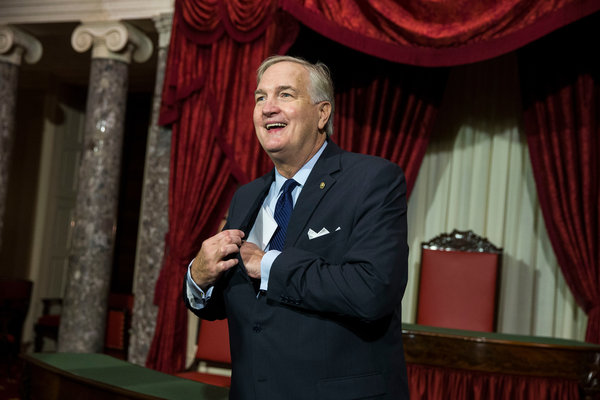
WASHINGTON — More than any other elected official, Senator Jeff Sessions of Alabama laid the intellectual foundation for President Trump’s brand of nationalist politics, agitating for a hard line on immigration and trade while most other Republicans were in thrall to the U.S. Chamber of Commerce and Mr. Trump was still firing contestants on “The Apprentice.”
Mr. Sessions, who was sworn in as attorney general on Thursday, was succeeded on the same day in the Senate by the attorney general of Alabama, Luther Strange, a former Washington lobbyist and onetime partner at a white-shoe Birmingham law firm with deep ties to the establishment wing of the Republican Party.
“He’s going to be a mainstream conservative Republican,” Karl Rove, the former strategist for George W. Bush, predicted of Mr. Strange, whom he met in the 1990s when the two worked together on the ferocious campaign for Republican control of the Alabama Supreme Court. “He’s very smart, really hard-working.”
The ascension of Mr. Strange to the seat Mr. Sessions held for 20 years offers a vivid illustration of how, even as Mr. Trump tries to steer the Republican Party toward a more populist orientation on some issues, the institutional party still largely comprises business-aligned Republicans.
Mr. Strange, 63, whose appointment was enthusiastically welcomed by the Senate majority leader, Mitch McConnell, is no stranger to the swamp, Mr. Trump’s derisive term for the nation’s capital. After playing in the low post on a basketball scholarship at Tulane University, the towering Mr. Strange — whose nickname, “Big Luther,” eventually ended up in campaign television advertisements — found his way to Washington to run the government affairs office for Sonat Offshore, then an influential gas utility based in Alabama.
“He knows how legislation gets done and doesn’t get done, and that gives him a leg up on others who may have a steeper learning curve,” said Clay Ryan, the vice chancellor for government affairs at the University of Alabama System.
A Birmingham native reared in the city’s comfortable suburbs, Mr. Strange eventually made his way home from Washington and became a partner at a powerhouse law firm that represents many of Alabama’s muscular corporate interests.
After working in politics on the outside, including his efforts with Mr. Rove to tilt the state’s judicial system toward business and away from trial lawyers, Mr. Strange entered a race of his own in 2006. He defeated one political scion for the Republican nomination for lieutenant governor, George Wallace Jr., but narrowly lost to another, Jim Folsom Jr., a Democrat and former governor, in the general election.
Four years later, Mr. Strange found success, defeating the incumbent attorney general, a Republican, in the primary and easily winning election that fall. He has cut a prominent profile in Montgomery, the state capital, raising considerable money for the national Republican attorneys general association and making no secret of his ambition to run for higher office. As attorney general, he helped to negotiate a landmark settlement with BP after the catastrophic 2010 oil spill in the Gulf of Mexico.
He has also made some enemies in a state with one-party rule, where the most consequential rivalries are between warring Republican factions. Michael G. Hubbard, the speaker of the House, who engineered the Republican takeover of Montgomery, was convicted last year of ethics charges and removed from office.
Mr. Hubbard blamed political vendettas for his prosecution, which was handled by lawyers from Mr. Strange’s office. (Mr. Strange appointed an acting attorney general to oversee the investigation and trial.)
But by the time Mr. Hubbard was found guilty in June, Gov. Robert Bentley, who appointed Mr. Strange to his Senate seat, was embroiled in his own controversy after a recording of a sexually charged conversation with a top aide became public.
Mr. Bentley, who divorced his wife of 50 years in the months before the recording shocked Alabama, denied that he had had a physical relationship with the woman who was his senior political adviser or that he had committed a crime. Still, the scandal left him politically weak, widely mocked and prone to scrutiny, including an impeachment inquiry in the Legislature.
Mr. Strange proved a central, if quiet, figure in the fallout, and the Legislature suspended its inquiry at his request when he said his office was doing “related work.”
On Thursday, Mr. Strange noted that he had never said specifically that Mr. Bentley was a target of his office, and the governor, who will name Mr. Strange’s successor as attorney general, denied any impropriety in his selection.
Although many Republicans in Alabama cheered Mr. Strange’s appointment, his action in connection with the governor’s scandal led to some skepticism in Montgomery ahead of a special election for the Senate seat that Mr. Bentley’s office said would be held in 2018.
“It’s grimly problematic that the attorney general who blocked the impeachment investigation and who has not gone forward with the Bentley criminal investigation is rewarded with the U.S. Senate appointment,” said the state auditor, Jim Zeigler, a Republican who is a frequent critic of the governor. “There will be a challenger to Luther Strange in the special Senate election, and this will be an issue. His manipulation against any Bentley investigation will be an issue.”
But Mr. Strange will probably have strong support from many senior Republicans.
On Thursday, just before a flood of questions about his own scandal and Mr. Strange’s connection to its aftermath, Mr. Bentley said that Mr. McConnell had sent a clear signal in recent months.
“I went by his office, and the first person that he actually mentioned was Luther Strange,” the governor said. “He named several people, but the first one that he mentioned was Luther Strange.”
For Original Article
https://mobile.nytimes.com/2017/02/09/us/politics/luther-strange-senate-jeff-sessions-alabama.html